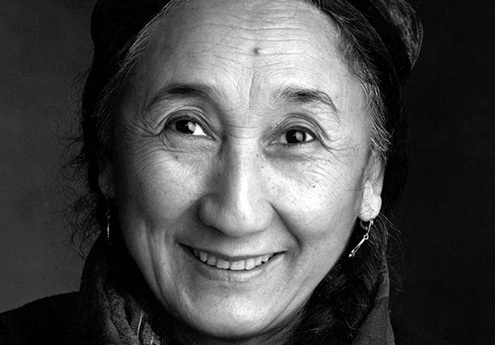Rebiya Kadeer was invited by a Taiwanese arts organization to attend screenings of “The 10 Conditions of Love”, a documentary about her  life but she banned from entering this country for next three years.
life but she banned from entering this country for next three years.
“The 10 Conditions of Love” is a story of a woman, a man, a family, a people and a homeland. It is the story of Rebiya Kadeer and also the story of the other Tibet, the Muslim Tibet – the country its people call East Turkestan, but which the Chinese call Xinjiang Province.
The Rafto Foundation interviewed Rebiya Kadeer in April 2010 during her participation at the Oslo Freedom Forum. The interview focused on her current life situation and activities since her release from the Chinese prison in 2005.
Here are the main accents.
Represents voices of oppressed
Freedom of expression is important to Rebiya Kadeer. “Through freedom of expression I represent voices of oppressed Uyghur people”, she says.
“In prison I experienced how it is to be a human being without freedom. After my release I decided to use my freedom to work for those who don’t have any. It is my duty as a free person to speak out on behalf of those who are not allowed to speak”, tells Kadeer.
In her speech at the Oslo Freedom Forum, Kadeer said “We cannot be silent about human rights atrocities being carried out against the Uyghur people.
We must continue to speak out on behalf of the mothers whose sons are being tortured in Chinese prisons; the wives who are afraid to ask what has happened to their husbands; and the children who are not allowed to speak their own language in  school. My people are living in an open prison. That is why I must speak out on their behalf”.
school. My people are living in an open prison. That is why I must speak out on their behalf”.
Mother of Uyghurs
Rebiya Kadeer is a leader of the World Uyghur Congress, an umbrella organisation for nearly two million Uyghurs who live outside the People´s Republic of China, and the Uyghur American Association, which represents around 1000 exiled Uyghurs in USA.
Kadeer is often called ‘mother of Uyghurs’. In the interview we asked if she feels so. “Yes, I do feel like the mother of Uyghurs and I am proud of it. I have taken upon myself this role because Uyghurs wished it. It is Uyghur people who have given me this name.
When I worked at the “Thousand Mothers Movement”, women made a crown for me and told me that I was their mother”, tells Kadeer. Rebiya Kadeer founded the “Thousand Mothers Movement” in 1997 to promote job training and employment for Uyghur women.
Authorities try to stop her
Since the unrest in Urumchi summer 2009 and ethnic violence exposing deep social rifts and grossly flawed government policies, restrictions on the freedom of expression have increased.
Rebiya Kadeer was accused by the Chinese authorities to be a ‘mastermind’ behind the unrest. “The Chinese authorities work broadly and are constantly trying to stop me whenever and wherever I travel”, explains Kadeer.
Chinese authorities have called upon governments not to issue Kadeer a visa; they have urged film festivals not to show a film about her life. “But our cause is even more important now. Uyghurs are suffering and these sufferings have increased after the unrest last year”, says Kadeer.
Rebiya Kadeer has no intention to stop her human rights activism despite the  fact that two of her sons are now serving lengthy prison sentences in the People´s Republic of China, despite the fact that they are tortured and have been forced to criticize their mother (in an interview which was broadcast on Chinese TV last year), despite that she has not had any contact with them since summer 2009.
fact that two of her sons are now serving lengthy prison sentences in the People´s Republic of China, despite the fact that they are tortured and have been forced to criticize their mother (in an interview which was broadcast on Chinese TV last year), despite that she has not had any contact with them since summer 2009.
Call for action
Rebiya Kadeer calls upon the international NGOs and politicians worldwide to monitor the situation in the region (Xinjiang Uyghur Autonomous Region), to put the pressure on the Chinese government to stop human rights violations, detentions, torture and executions of Uyghurs. She also calls for international engagement to release her sons from the Chinese prison.
HRH Bergen, based on Rafto Foundation article. See original one here.
Related links:
Uyghur farmer recaptured in Beijing





